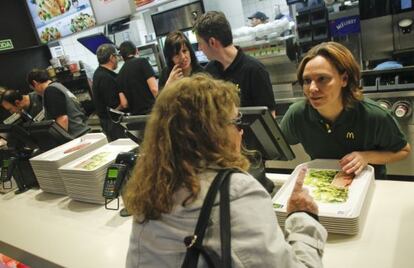Shop-floor bosses: what's the point?
McDonald's, Ikea and others like to confront their executives with reality The experience can be useful, experts say, but it depends on how it is done


Just one look inside the McDonald's restaurant near Puerta del Sol in Madrid was enough to realize that something was out of the ordinary. There was more personnel than usual behind the counter. All the workers wore broad smiles on their faces, but they were clearly nervous. The most revealing fact was that the employees were significantly older than the average fast-food worker. But the final proof that this was no ordinary day was standing at one of the cash registers: it was none other than Patricia Abril, president of McDonald's España, who was busy taking an order from the umpteenth tourist of the day.
As a matter of fact, the people busy in the kitchen or sweeping the floors were all executives from the human resources and financial departments. For one day, they were trading their desks for hands-on restaurant work.
Executive immersion in entry-level jobs is not something that McDonald's invented. Other major corporations such as Ikea, Inditex (owner of Zara, among several other fashion chains) and Starbucks implement similar initiatives every year. But do these initiatives really influence leadership styles or are they simply marketing strategies to keep images - and consciences - clean?
All the workers wore broad smiles but they were clearly nervous
"It's an idea that was first put into practice during the 1990s. It all depends on how you apply it," says Tomàs Rubió, director of the master's program in human resources management at UPF-Barcelona School of Management. One day among the staff can help motivate employees, increase the level of personal commitment and even reinforce executive leadership. But that's only if it is done right.
One of the keys to the success of such an initiative, warns this expert, is knowing which department came up with the plan: whether internal departments, human resources or marketing and advertising. "This type of practice makes sense if it is part of broader human resources policies. It makes no sense to just sell an image with no message behind it, turning your back to other strategies, training policies or reward programs."
The news that Marta Ortega would work as a Zara store clerk for a while caused something of a commotion in 2007. The daughter of Amancio Ortega, the billionaire founder of the Inditex empire, was starting her career like many other workers: by folding shirts and selling pants. The company favors internal promotion, and any executives coming in from the outside have to work at stores for a few days to understand the Inditex spirit.
The news that Marta Ortega would work as a Zara store clerk caused a commotion
At Ikea, meanwhile, it isn't enough for company leaders to put in store time at the beginning of their career. For at least five days out of every year, executives - no matter what their position in the corporate hierarchy - must don a clerk's jersey. "All the office employees, without exception, have to work at the store for a few days out of the year. They join the store team on weekends or significant calendar days, when there is a heavier workload," says Enrique Puig, head of human resources at the Swedish multinational. The idea, says Puig, is for executives never to lose touch with the clients. The project, which is called In Your Shoes, has several effects, he adds.
"On one hand, store workers are grateful to see office employees come down and join them, because on complicated days it is very useful to get that extra help. After that, depending on the office person's job, their time at the store helps them realize different things. A human resources worker, for instance, might observe that certain forms of training would be useful for everyday work at the store."
At Ikea, Puig says, hierarchies are already very diluted, so the project adapts well to the company's philosophy. "This is not a one-off campaign. We always do it, because it's in our DNA."
It can make sense if it is part of broader human resources policies"
Watching millionaires and white-collar executives get their hands dirty is especially attractive in countries like the United States. And if the boss is there incognito, there can even be enough material for a television program. Undercover Boss, which is aired on the Xplora channel in Spain, follows chiefs of companies like Subway, O'Neill or Frontier Airlines as they pass themselves off for newly hired, entry-level employees at their own companies. At the end of each episode, the executives always claim that the experience has made them better leaders.
"Whether executives get something out of spending a day among their employees depends very much on their own personality," notes Rubió. "Peter Druker, the great genius of management, used to say that good communication and good personal relationships with the workers is an imperative at any well-run business. But for the leaders to send out the right message, they need to have solid arguments, values and empathy. We should not confuse the charismatic leader with the manipulative leader."
"This is a reality check," said the president of McDonald's España during her day at the restaurant in downtown Madrid. "This is more complicated than it seems. While you're at it, going nonstop, you don't realize it. But when you stop, that's when you realize how tired you are."
This is not a one-off campaign. We do it because it's in our DNA"
Abril explains that this is not the first time she has gotten a close look at a restaurant: all executives spend at least 50 hours serving burgers before joining the company's top echelons. But on this occasion they decided to take the idea further and make an entire team of execs run the restaurant with no help from regular employees, just the store manager. Kitchen, cashier and cleaning duties were shared out among them.
"Tomorrow we will spend the day reflecting on what happened here today. We will analyze our impressions. Being here helps you realize many things. For instance, if you notice that customers have a hard time making up their minds, it might be because the menu panels are not well organized, or because we should rethink their location," says Abril. But these kinds of decisions will be made back inside their offices.
Tu suscripción se está usando en otro dispositivo
¿Quieres añadir otro usuario a tu suscripción?
Si continúas leyendo en este dispositivo, no se podrá leer en el otro.
FlechaTu suscripción se está usando en otro dispositivo y solo puedes acceder a EL PAÍS desde un dispositivo a la vez.
Si quieres compartir tu cuenta, cambia tu suscripción a la modalidad Premium, así podrás añadir otro usuario. Cada uno accederá con su propia cuenta de email, lo que os permitirá personalizar vuestra experiencia en EL PAÍS.
¿Tienes una suscripción de empresa? Accede aquí para contratar más cuentas.
En el caso de no saber quién está usando tu cuenta, te recomendamos cambiar tu contraseña aquí.
Si decides continuar compartiendo tu cuenta, este mensaje se mostrará en tu dispositivo y en el de la otra persona que está usando tu cuenta de forma indefinida, afectando a tu experiencia de lectura. Puedes consultar aquí los términos y condiciones de la suscripción digital.








































